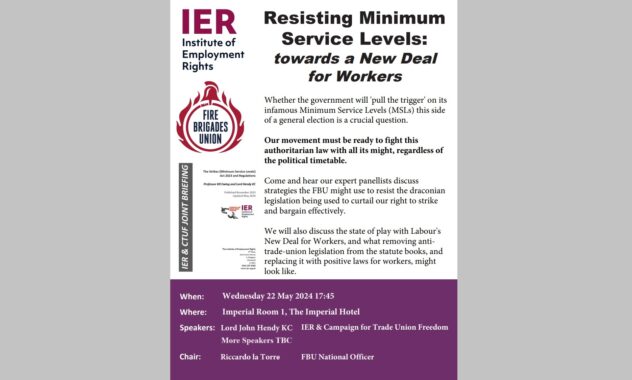1 in 5 workers’ right to strike at risk because of the government’s anti-strikes bill
Around 5.5 million workers across the Britain have their right to strike threatened by the Strikes Bill

The TUC has warned that the right to strike of a massive 1 in 5 workers in Britain is at risk because of the Conservative government’s Strikes (Minimum Service Levels) Bill.
New analysis published by the union body shows that 5.5 million workers in England, Scotland and Wales could be affected by the legislation. Workers in Northern Ireland aren’t subject to the Bill.
Those 5.5 million workers have their right to strike threatened because – if passed unamended – the Bill will mean that when workers lawfully vote to strike in health, education, fire, transport, border security and nuclear decommissioning, they could be forced to attend work – and sacked if they don’t comply.
The legislation continues to make it way through Parliament, and was due for its third reading in the House of Lords on Tuesday.
The Bill recently suffered heavy defeats in the Lords, as all the opposition amendments laid were voted through, including an amendment to stop frontline workers getting sacked for exercising their right to strike.
Huge numbers of British workers
The TUC says the Conservative government must drop the Strikes Bill in its entirety and protect the right to strike.
And the EHRC recently warned that the legislation could see all striking workers in affected sectors losing their unfair dismissal protection as whole strikes could be deemed illegal.
The TUC says the Bill should provoke “serious opposition from UK politicians” as it continues its passage through parliament, given the huge numbers set to lose their right to strike.
The union body says the UK government has failed to come clean about the draconian nature of the Bill – and has accused ministers of “shortcutting” normal scrutiny procedures by “ramming” the Bill through the parliament.
The Bill will give ministers the power to impose new minimum service levels through regulation.
But MPs have been given few details on how minimum service levels are intended to operate.
The House of Lords Delegated Powers and Regulatory Reform Committee recently criticised the Bill for giving blanket powers to UK ministers while providing virtually no detail.
The Bill has faced a barrage of criticism from civil liberties organisations, the joint committee on human rights, House of Lords Delegated Powers and Regulatory Reform Committee, race and gender equalities groups, employment rights lawyers, politicians around the world – and a whole host of other organisations.
TUC General Secretary Paul Nowak said:
“This Conservative government is threatening the right to strike of as many as one in five workers up and down the country. This is a spiteful Bill. No one should be sacked for trying to win a better deal at work.
“But this draconian legislation would mean that when workers democratically vote to strike, they could be forced to work and sacked if they don’t comply. It’s undemocratic, it’s unworkable and it’s very likely illegal.
Ministers have tried to keep the public in the dark about the true nature of this Bill. They are ramming it through– shortcutting normal parliamentary procedures and ducking scrutiny. And they are giving themselves the power to snatch away the right to strike of five and a half million workers.
With inflation still running at over 10%, the last thing workers need is for ministers to make it harder to secure better pay and conditions. It’s time for ministers to protect the right to strike and ditch this Bill for good.”
Methodology: This analysis uses the October to December 2022 figures from the Quarterly Labour Survey for employees in England, Wales and Scotland. It includes total figures of those working in health service activities, fire service activities, education, transport, nuclear decommissioning and border security (the sectors named in the Bill). This is used to calculate the total number working in industries affected by the bill in England, Wales and Scotland.
| Industry | Total (exc. NI) |
| All in employment | 27,561,364 |
| Health services | |
| 86 Human health activities | 2292690 |
| Fire and rescue | |
| 84.25 Fire service activities | 55189 |
| Education | |
| 85.10 Pre-primary education | 160744 |
| 85.20 Primary education | 1053813 |
| 85.31 General secondary education | 791295 |
| 85.32 Techl and vocational secondary educ | 81859 |
| Total education | 2087711 |
| Transport | |
| 49 Land transport inc via pipelines | 493340 |
| 50 Water transport | 48570 |
| 51 Air transport | 57026 |
| 52 Warehousing & support for transport | 411091 |
| Total transport | 1010027 |
| Decomissioning of nuclear installations etc | |
| 38.22 Treatment & disposal of hazardous waste | 15408 |
| 39.00 Remediation actvity & other waste mgmt serv | 32864 |
| Total nuclear | 48272 |
| Border security* | |
| 84.24 Public order and safety activities | 370774 |
| Total in industries covered by bill | 5493889 |







